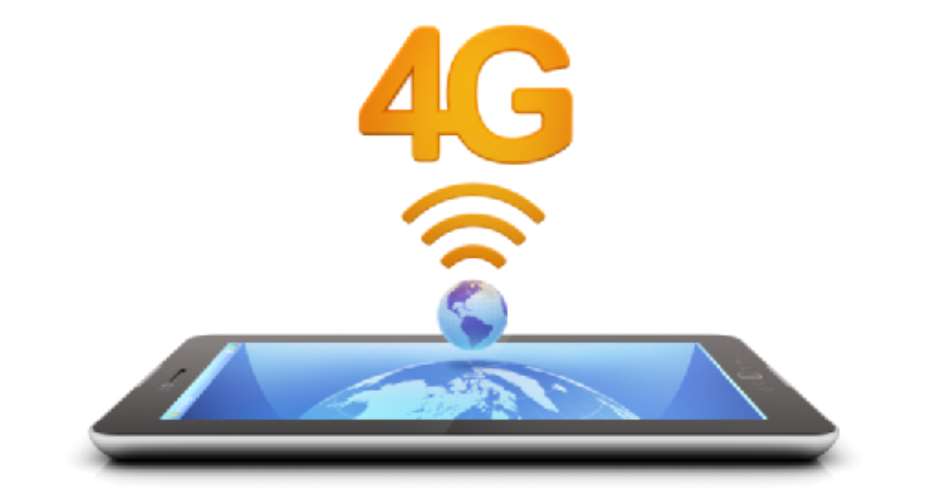While Ghana’s National Communication Authority (NCA) is awaiting bids from prospective investors for the award of the rest of the 4th Generation (4G), Long Term Evolution (LTE) licenses, some industry players are engaged in a media war over the right to be awarded.
The telecoms companies which form part of the Chamber of Telecoms, insist that the process should be opened to all communications companies, whether foreign or national.
A break-away group, the Information and Communications Technology (ICT) Chamber, wants the process to be reserved for only local investors.
Ghana has awarded three 4G LTE licenses within the 2,600 Mega Hertz (2,600 mhZ) band to Surfline, Blu Telecom and Goldkey, all which claim to be local Ghanaian companies, at the cost of about 7.0 million U.S. Dollars.
Eben Twum Asante, Chief Executive Officer (CEO) of mobile telecom giants, MTN, however argued during an encounter with the Network of Communications Reporters (NCR) that government should consider the fact that time was no more on the side of Ghana in respect of the viability of the 4G Spectrum, and must expedite action on the award of the license.
“Spectrum is one of the fastest perishable products because it is technology led,” Asante emphasized, urging that government must act on the licensing with dispatch so the country could reap the benefits of the technology before 5G sets in, and makes the 4G obsolete.
The NCA has opened the bids for interested investors for the spectra available to the nation at the cost of over 60 million dollars.
The NCA has made it compulsory that any company that wants to acquire the 4G license within the 800 MHz should have at least 35 percent local content.
While Vodafone and Airtel, two of the six mobile telecoms operators in the country, have 30 percent and 25 percent Ghana government shares respectively, MTN is a wholly owned South African company.
Twum-Asante said although supporting indigenous companies in any venture was critical, the national interest would not be served if foreign companies with the capacity to deploy a better service were sidelined.
He therefore urged that the interest of Ghana must first and foremost be considered so that Ghanaians “can enjoy the best of speed available just as any other player in any advanced market as far as ICT is concerned”.
According to him, MTN is in the process of meeting the 35 percent local content condition set by the NCA for the acquisition of the 4G LTE license.
At a press conference on Thursday, Chief Executive Officer of Chamber of ICTs, Paul Adom-Okyere, challenged the government to consider national interest and reserve the rest of the 4G-LTE spectra to locals.
"A local consortium will be able to raise the needed 35 million dollars that will ensure that Ghanaians own that spectrum so that MTN will buy capacity in that spectrum. Vodafone will also buy capacity from that spectrum,” Adom-Okyere stated.
He accused the NCA of shifting the goalposts and going against an earlier promise to allocate the 4G LTE spectrum to only Ghanaian-owned telecom firms.
“The posturing of the NCA could occasion significant loss of investment and loss of opportunity to create a giant Ghanaian ICT centre similar to what they have in the United States, England and South Africa,” the ICT Chamber Chief Executive had said.
However, Director of Consumer and Corporate Affairs at NCA, Nana Dufie Badu, rebuffed the allegations on a television talk show - PM Express - late Thursday.
According to her, the NCA over the past years had rather encouraged Ghanaian participation in the telecommunication space.
She explained that the eligibility criteria for applicants in the 4G LTE spectrum auction stated clearly that bidding firms must have a minimum of 35 local Ghanaian participation or local Ghanaian ownership.
This critical criterion was arrived at after several consultations with key industry players, including Ghanaian-owned firms, in the telecoms space, said Budu.
The 800 MHz, which was reserved for broadcasting, became available as Ghana is taking steps on digital migration, and more would become available as TV stations migrate on to the digital terrestrial.
An industry analyst, Nii Narku Dowuona, told this reporter that the members of the ICT chamber were only fighting to fend off competition from the big telecoms companies over the provision of the 4G-LTE services, as they claimed they were yet to recoup their investments. Enditem.





 There’s nothing you can do for us; just give us electricity to save our collapsi...
There’s nothing you can do for us; just give us electricity to save our collapsi...
 Ghanaian media failing in watchdog duties — Sulemana Braimah
Ghanaian media failing in watchdog duties — Sulemana Braimah
 On any scale, Mahama can't match Bawumia — NPP Youth Organiser
On any scale, Mahama can't match Bawumia — NPP Youth Organiser
 Never tag me as an NPP pastor; I'm 'pained' the 'Akyem Mafia' are still in charg...
Never tag me as an NPP pastor; I'm 'pained' the 'Akyem Mafia' are still in charg...
 Your refusal to dedicate a project to Atta Mills means you never loved him — Kok...
Your refusal to dedicate a project to Atta Mills means you never loved him — Kok...
 2024 elections: I'm competent, not just a dreamer; vote for me — Alan
2024 elections: I'm competent, not just a dreamer; vote for me — Alan
 2024 elections: Forget NPP, NDC; I've the Holy Spirit backing me and nothing wil...
2024 elections: Forget NPP, NDC; I've the Holy Spirit backing me and nothing wil...
 2024 elections: We've no trust in judiciary; we'll ensure ballots are well secur...
2024 elections: We've no trust in judiciary; we'll ensure ballots are well secur...
 Performance tracker: Fire MCEs, DCEs who document Mahama's projects; they're not...
Performance tracker: Fire MCEs, DCEs who document Mahama's projects; they're not...
 Train crash: Railway ministry shares footage of incident
Train crash: Railway ministry shares footage of incident
